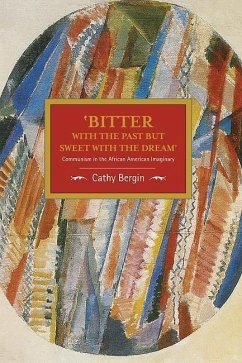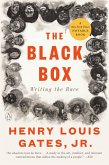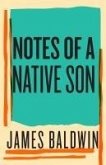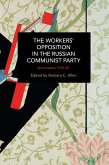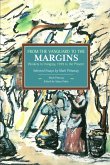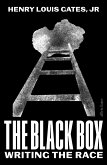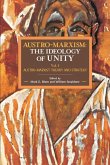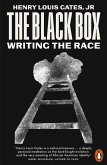Cathy Bergin
'Bitter with the Past But Sweet with the Dream'
Communism in the African American Imaginary
Cathy Bergin
'Bitter with the Past But Sweet with the Dream'
Communism in the African American Imaginary
- Broschiertes Buch
- Merkliste
- Auf die Merkliste
- Bewerten Bewerten
- Teilen
- Produkt teilen
- Produkterinnerung
- Produkterinnerung
An engaging, wide-ranging, and groundbreaking reexamination of the relationship between African American writers and the communist movement in the US.
Andere Kunden interessierten sich auch für
![The Black Box The Black Box]() Gates, Henry Louis, Jr.The Black Box19,99 €
Gates, Henry Louis, Jr.The Black Box19,99 €![Notes of a Native Son Notes of a Native Son]() James BaldwinNotes of a Native Son28,99 €
James BaldwinNotes of a Native Son28,99 €![The Workers' Opposition in the Russian Communist Party The Workers' Opposition in the Russian Communist Party]() The Workers' Opposition in the Russian Communist Party64,99 €
The Workers' Opposition in the Russian Communist Party64,99 €![From the Vanguard to the Margins From the Vanguard to the Margins]() Mark PittawayFrom the Vanguard to the Margins38,99 €
Mark PittawayFrom the Vanguard to the Margins38,99 €![The Black Box The Black Box]() Gates, Henry Louis, Jr.The Black Box26,99 €
Gates, Henry Louis, Jr.The Black Box26,99 €![Austro-Marxism: The Ideology of Unity Austro-Marxism: The Ideology of Unity]() Austro-Marxism: The Ideology of Unity50,99 €
Austro-Marxism: The Ideology of Unity50,99 €![The Black Box The Black Box]() Gates, Henry Louis, Jr.The Black Box12,99 €
Gates, Henry Louis, Jr.The Black Box12,99 €-
-
-
An engaging, wide-ranging, and groundbreaking reexamination of the relationship between African American writers and the communist movement in the US.
Produktdetails
- Produktdetails
- Historical Materialism
- Verlag: Haymarket Books
- Seitenzahl: 222
- Erscheinungstermin: 26. Juli 2016
- Englisch
- Abmessung: 226mm x 150mm x 13mm
- Gewicht: 326g
- ISBN-13: 9781608466399
- ISBN-10: 1608466396
- Artikelnr.: 43896828
- Herstellerkennzeichnung
- Libri GmbH
- Europaallee 1
- 36244 Bad Hersfeld
- gpsr@libri.de
- Historical Materialism
- Verlag: Haymarket Books
- Seitenzahl: 222
- Erscheinungstermin: 26. Juli 2016
- Englisch
- Abmessung: 226mm x 150mm x 13mm
- Gewicht: 326g
- ISBN-13: 9781608466399
- ISBN-10: 1608466396
- Artikelnr.: 43896828
- Herstellerkennzeichnung
- Libri GmbH
- Europaallee 1
- 36244 Bad Hersfeld
- gpsr@libri.de
Cathy Bergin (DPhil (2004) is a Senior Lecturer in the Humanities Programme at the University of Brighton.
Acknowledgements
Introduction
PART I: RADICAL ALLIANCES
Chapter One: 'Towards Soviet America'
1.1 Determinations and determinism: Lenin, Stalin and the Comintern
1.2 Swearing allegiances: Garveyism and Communism
1.3 Trials on trial: Yokine2.1n and Scottsboro
Chapter Two: The Liberator (1929-1935)
2.1 The Liberator: the black bourgeoisie and revolutionary tradition
2.2 The Liberator: interracial solidarity and internationalism
2.3 The Liberator: black cultural politics
Chapter Three: Native Son: Ghetto Nightmares
3.1 'Poor Richard Wright': the black protest novel
3.2 A room of one's own?: Bigger, rage and consciousness
3.3 'Russian folks': The Communist Party in Native Son
PART II: BETRAYALS AND DEFEAT
Chapter Four: 'Communism is the Twentieth Century Americanism'
4.1 Popular Front: remaking African American culture
4.2 Peace and war: shifting priorities
Chapter five: Lonely Crusade: Union Dues
5.1 'History as nightmare': The critical reception of Lonely Crusade
5.2 'This illusion of manhood': Lee Gordon, rage and impotence
5.3 'Sure, I 'longs to the Party. But I is a nigger first': the Communist
Party in Lonely Crusade
Chapter six: Invisible Man: Un-American Activities
6.1 'Beautiful absurdity': Ellison, responsibility and identity
6.2 'Riding race again': the Communist Party in Invisible Man
Conclusion
Bibliography
Index
Introduction
PART I: RADICAL ALLIANCES
Chapter One: 'Towards Soviet America'
1.1 Determinations and determinism: Lenin, Stalin and the Comintern
1.2 Swearing allegiances: Garveyism and Communism
1.3 Trials on trial: Yokine2.1n and Scottsboro
Chapter Two: The Liberator (1929-1935)
2.1 The Liberator: the black bourgeoisie and revolutionary tradition
2.2 The Liberator: interracial solidarity and internationalism
2.3 The Liberator: black cultural politics
Chapter Three: Native Son: Ghetto Nightmares
3.1 'Poor Richard Wright': the black protest novel
3.2 A room of one's own?: Bigger, rage and consciousness
3.3 'Russian folks': The Communist Party in Native Son
PART II: BETRAYALS AND DEFEAT
Chapter Four: 'Communism is the Twentieth Century Americanism'
4.1 Popular Front: remaking African American culture
4.2 Peace and war: shifting priorities
Chapter five: Lonely Crusade: Union Dues
5.1 'History as nightmare': The critical reception of Lonely Crusade
5.2 'This illusion of manhood': Lee Gordon, rage and impotence
5.3 'Sure, I 'longs to the Party. But I is a nigger first': the Communist
Party in Lonely Crusade
Chapter six: Invisible Man: Un-American Activities
6.1 'Beautiful absurdity': Ellison, responsibility and identity
6.2 'Riding race again': the Communist Party in Invisible Man
Conclusion
Bibliography
Index
Acknowledgements
Introduction
PART I: RADICAL ALLIANCES
Chapter One: 'Towards Soviet America'
1.1 Determinations and determinism: Lenin, Stalin and the Comintern
1.2 Swearing allegiances: Garveyism and Communism
1.3 Trials on trial: Yokine2.1n and Scottsboro
Chapter Two: The Liberator (1929-1935)
2.1 The Liberator: the black bourgeoisie and revolutionary tradition
2.2 The Liberator: interracial solidarity and internationalism
2.3 The Liberator: black cultural politics
Chapter Three: Native Son: Ghetto Nightmares
3.1 'Poor Richard Wright': the black protest novel
3.2 A room of one's own?: Bigger, rage and consciousness
3.3 'Russian folks': The Communist Party in Native Son
PART II: BETRAYALS AND DEFEAT
Chapter Four: 'Communism is the Twentieth Century Americanism'
4.1 Popular Front: remaking African American culture
4.2 Peace and war: shifting priorities
Chapter five: Lonely Crusade: Union Dues
5.1 'History as nightmare': The critical reception of Lonely Crusade
5.2 'This illusion of manhood': Lee Gordon, rage and impotence
5.3 'Sure, I 'longs to the Party. But I is a nigger first': the Communist
Party in Lonely Crusade
Chapter six: Invisible Man: Un-American Activities
6.1 'Beautiful absurdity': Ellison, responsibility and identity
6.2 'Riding race again': the Communist Party in Invisible Man
Conclusion
Bibliography
Index
Introduction
PART I: RADICAL ALLIANCES
Chapter One: 'Towards Soviet America'
1.1 Determinations and determinism: Lenin, Stalin and the Comintern
1.2 Swearing allegiances: Garveyism and Communism
1.3 Trials on trial: Yokine2.1n and Scottsboro
Chapter Two: The Liberator (1929-1935)
2.1 The Liberator: the black bourgeoisie and revolutionary tradition
2.2 The Liberator: interracial solidarity and internationalism
2.3 The Liberator: black cultural politics
Chapter Three: Native Son: Ghetto Nightmares
3.1 'Poor Richard Wright': the black protest novel
3.2 A room of one's own?: Bigger, rage and consciousness
3.3 'Russian folks': The Communist Party in Native Son
PART II: BETRAYALS AND DEFEAT
Chapter Four: 'Communism is the Twentieth Century Americanism'
4.1 Popular Front: remaking African American culture
4.2 Peace and war: shifting priorities
Chapter five: Lonely Crusade: Union Dues
5.1 'History as nightmare': The critical reception of Lonely Crusade
5.2 'This illusion of manhood': Lee Gordon, rage and impotence
5.3 'Sure, I 'longs to the Party. But I is a nigger first': the Communist
Party in Lonely Crusade
Chapter six: Invisible Man: Un-American Activities
6.1 'Beautiful absurdity': Ellison, responsibility and identity
6.2 'Riding race again': the Communist Party in Invisible Man
Conclusion
Bibliography
Index

